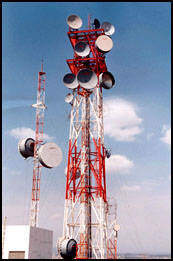 LOOKING TOWARDS THE FUTURE: TELECOM AND IT LOOKING TOWARDS THE FUTURE: TELECOM AND IT |
At first glance, the Mexican telecom sector would seem perfect for investment. After all, it generates revenues of more than US$10 billion a year and is the second-largest telecom market in Latin America. And with the recent surge in Internet usage and the growing competition among service providers, analysts predict that the sector will grow like never before in the next few years.

Nonetheless, the Mexican telecom sector is not without its problems. Telefonos de Mexico (Telmex), once the national telephone company, was privatized in 1990, the year its monopoly on long-distance service was broken. Since then, the industry has undergone a slow transition from government control toward the open market. Between 1994-96, for example, 11 private companies were created to compete with Telmex. And in 1996, the Zedillo administration created a telecom regulatory agency called the Federal Telecommunications Commission (Cofetel).
Despite these advances, Telmex continues to dominate Mexico's local, international, and cellular-phone markets, not to mention the quickly growing Internet market. About two years ago, Cofetel and the anti-monopoly watchdog CFC deemed that Telmex was indeed a monopoly. The rules restricting the company's dominance, however, are still pending, a fact that only corroborates competitors' claims that Cofetel looks the other way while Telmex sucker punches the opposition.
Many of Telmex's competitors-namely long-distance carriers Alestra and Avantel-complain that Telmex's President Carlos Slim has resorted to a number of unfair business practices in order to maintain his grip on 60 percent of the market. Avantel and Alestra complain about slamming as well. Slamming is when a client asks to switch to another service, but is still billed by the previous carrier. It usually takes so long to sort out the billing that people decide to stick with Telmex.
Furthermore, neither Avantel nor Alestra have developed any significant infrastructure of their own and must therefore use that of Telmex. Their primary complaint is that Telmex charges them unreasonable fees to complete the domestic portion of their calls. Telmex argues that its rates are fair and that competitors have no case.
"They haven't invested anything in infrastructure, so they use Telmex's," says Arturo Elias Ayub, communications director for Telmex. "Certainly, we can't give it away to them."
These complaints have given rise to a number of rows between the United States and Mexico. The U.S. Federal Communications Commission, for example, has fined Telmex's U.S. subsidiary US$100,000 to discourage what it considered non-competitive practices. And just recently, the U.S. Trade Representative made an official complaint to the WTO about Telmex's dubious business practices. There has also been talk among Fox supporters of creating a more active, independent regulatory body.
"I have heard declarations made by Fox's team of (their plans to create) an autonomous and independent regulatory agency," says Ayub. "I hope so. We would be delighted with that kind of institution. When all is said and done, a healthy industry is in all of our best interests."
International and domestic investors are still making forays into the market, Telmex's dominance notwithstanding. Four different wireless companies now offer local telephone service, when just a year ago, there weren't any at all. Long-distance carriers Avantel and Alestra both have announced plans to enter into the local market soon. One of the most successful local service providers has been fixed-wire company Axtel, which offers local, national, and international long-distance, as well as Internet service. Pegaso now operates in four major Mexican cities, including Tijuana, Guadalajara, and Mexico City, and plans to expand its digital cellular network to 18 other countries by the end of the year.
The telecom sector's growing competitiveness could not have come at a better time for Mexico, which now has only about 10 million telephone lines, or 10.3 lines per 100 inhabitants, one of the lowest teledensity levels in all of Latin America. Studies indicate that Mexico will be the first country where cellular lines equal or exceed fixed telephone lines. Little surprise, such low teledensity levels have led to enormous growth in the cellular phone market, which grew 150 percent last year.

Mexico's cellular and wireless telephone services
have grown so fast in the past year that cellular
companies have had trouble keeping up with new clients.
According to the federal government, leading cellular
phone companies Telcel/America Movil and Iusacell
(Bell Corporation) saturated frequency ranges, which
resulted in widespread inadequate service. In response,
the government ordered that the two companies compensate
their clients. |
Iusacell, the first cellular service provider in Mexico City, is truly one of the heavy hitters in the cellular market. The company now enjoys access-via the cellular or the PCF spectrum-to six of a total of nine band-service regions in Mexico.
"The tremendous success we've been enjoying in the financial arena (in Mexico) is due to the financial world's confidence in our result and commitment," says Iusacell President Fluvio del Valle.
The Internet and information technology (IT) market is undoubtedly the most competitive of the telecom sector, and is expected to grow rapidly in the future. By the end of 2000, there will be around 2.2 million users connected to the Internet in Mexico, a number that is expected to increase to 8.5 million by 2005. Indicative of the popularity of IT and Internet-related activities is the current wave of companies-from Telmex and television station TV Azteca to Banamex, Bancomer, and even Cemex-that are launching new web sites and internet portals.
E-commerce, though still in the early stages of development, is beginning to take off slowly as well.

"Certainly, there's an enormous amount to do," says David F. Hite, general manager for Intel, the largest microchip manufacturer in the world. Hite adds that he thinks that Mexico has a number of advantages-such as its proximity to the United States, its free-trade agreements, and overall education level-that will allow it to be "a leader in Latin America for the adoption of e-commerce."
While U.S.-based Internet providers still control a large portion of the market (StarMedia or Yahoo's Mexican version), many entrepreneurs from Mexico and other Spanish speaking countries are investing, most notably Terra.com of Spain and Telmex-backed T1msn. Other players in the market include Banco Serfin-backed venture Patagon.com, as well as the typical host of upstart Internet companies hoping to make the big time or create enough waves to be noticed by a bigger company with venture capital.
Another market within IT includes information security and encryption. Network Associates, the world's largest independent network security and management software company, established a presence in Mexico in 1997.
"We are expecting great growth in Mexico both from the government and the private sector," says Network Associates National Sales Director Fernando Fonseca Camacho.
Network Associates is especially keen to expand into growing IT markets outside the Federal District, such as the industrial corridor running between Queretaro to Aguascalientes and the maquiladoras all along the border.
"All this maquiladora industry coming to the interior to manufacture is an area where we see a lot of opportunity," adds Fonseca Camacho.
Another global IT players big on Mexico are Hewlett Packard, Sun Microsystems, SAP or for instance Cisco Systems, the world's largest network equipment manufacturer, which has been in Mexico since 1993. Indeed, Cisco Systems is particularly keen to invest in fiber optic systems for both long distance service and optical transmissions within metropolitan areas.
"Mexico is a country with a very good potential for the future that is willing to adapt fast and be a pioneer in adopting the Internet for business," says Cisco Systems Director Jaime Carpenter.
MVS Telecom represents another major actor in the Mexican IT market. The company is essentially broken into two areas. The first is devoted to the creation and management of web portals, currently six in number and including Ad-net and Plazaclick.com, among others. The second area is focused solely on telecommunications. MVS also does sales for Yahoo Mexico, America Online, StarMedia, Terra, and El Sitio, among others.
When asked about the company's investment plans, MVS Telecom President Adrian Vargas is openly optimistic.
"In telecom," he says, "we are planning to invest US$600 million in the next year."
The excitement generated by the IT sector in Mexico may very well be a fitting symbol of the Mexican economy as a whole: young, fast, energetic, innovative, and oriented toward the future. Mexico has embraced the globalization process like no other nation, negotiating free-trade agreements left and right, improving infrastructure, and opening the economy to private investment. And considering its strong macroeconomic outlook, budding democracy, and a new business-minded president in Vicente Fox, there are no limits what Mexico can do in the next decade. |

